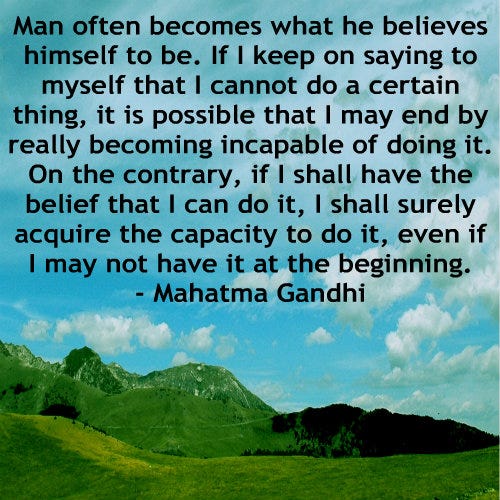Beliefs and Perceptions
How Are Yours Working For You?
Beliefs and perceptions play a major role in your quest to age well. They shape who you are, affect your actions, and determine your quality of life. A belief is defined as a person’s habit of of trusting or having confidence in someone or something. A perception is defined as a person’s sensory experience of the world.
Beliefs are usually accepted as valid and they influence perceptions. Yet, just because things are viewed in a certain way doesn’t make them true.
Research has shown that your perception of the world is influenced by your expectations or “prior beliefs.” They help you understand what is happening in the present based on past experience.
Let me share a story.
Two people are walking down the street. Sofia has had dogs since she was a child, she knows how to be with them. She keeps treats in her pocket for any dog she meets on her walks. Antonio has been bitten by several dogs, he has an irrational fear of dogs that he cannot control and is constantly afraid of seeing them. Suddenly, Sonny, a golden retriever, trots toward them.
Sofia digs in her pocket for a treat and smiles. The dog runs toward her. Antonio starts to sweat. His eyes dilate, his heart beats faster, and his fists clench. The dog, sensing his fear, starts to growl.
If this dynamic continues to its conclusion, Antonio may get bit again, thereby fulfilling his expectations. His fear may become a self-fulfilling prophecy creating predictable and repetitive cycles of conflict in life.
Sofia sees Sonny as a good friend. Antonio sees him as a vicious threat. Both are observing the same dog at the same time, but they perceive the situation differently. The dog could be wagging his tail and have his tongue hanging out, but if Antonio believes that dogs are dangerous, then he will ignore information to the contrary and actually change his perception of the situation to reflect his belief system.
This story is a perfect example of how Sofia’s and Antonio’s beliefs influence their perception of reality. Perception, then, shapes conscious and unconscious reactions, which impacts a situation and create a predictable outcome. In other words, perceptions influence thoughts, feelings, and reactions to a situation which in turn influences the outcome.
A fun exercise is to list five to ten beliefs you currently have and ask yourself where they came from. When 80-year-old Rena did the exercise, she identified several old beliefs. One was that she couldn’t play the piano because 70 years ago, a music teacher said she couldn’t. So, she never tried, even though she loved music. Then she read an article that said beliefs could be changed.
As an experiment Rena challenged that old belief by thinking “maybe, the teacher was wrong.” This thought freed her to give it a try. She hired a piano teacher, rented a piano, and watched YouTube videos. Much to her surprise, she could play the piano and loved it.
Based on her success, she made a new list of beliefs, reviewed them daily for a few weeks, and internalized them. She was thrilled how much the new beliefs changed her life.
Perception refers to the way sensory information is organized, interpreted, and consciously experienced. Changing your perception is not easy; BUT, if you don’t like your life, there are things you can do.
The Psych Central website offers excellent tips for changing perception.
Your perceptions are your reality; they change and flicker constantly. Changing your thoughts and trying to go from negative to positive costs nothing. Visualizing happiness and where you would like to be in your life takes a few minutes a few times a day. Appreciating what you have that is good in your life only makes you feel better and opens your eyes to more good things.
How are beliefs and perceptions influencing your goal of aging well?
Remember Mahatma Gandi’s words of wisdom.


